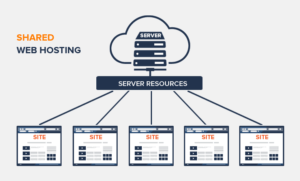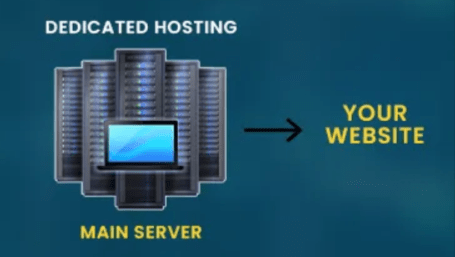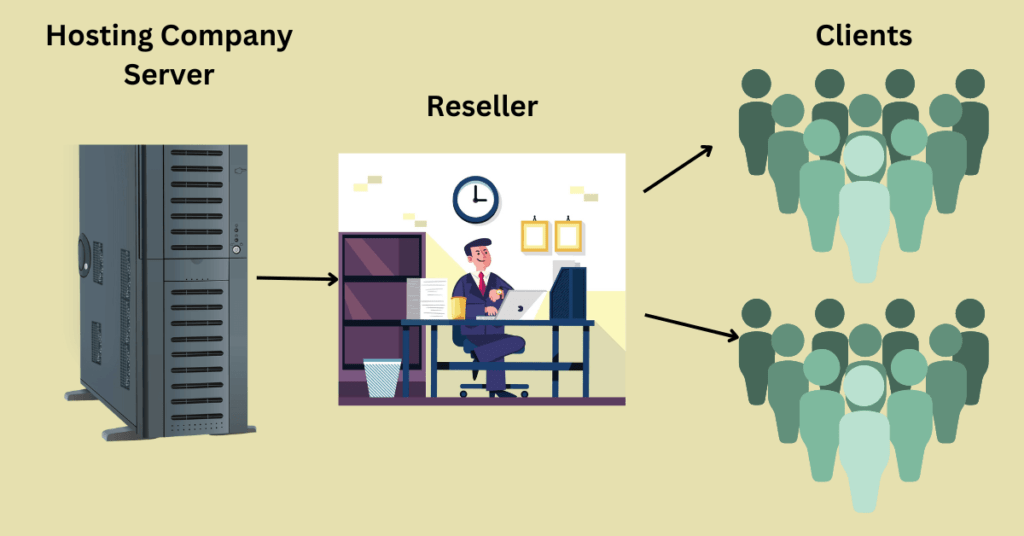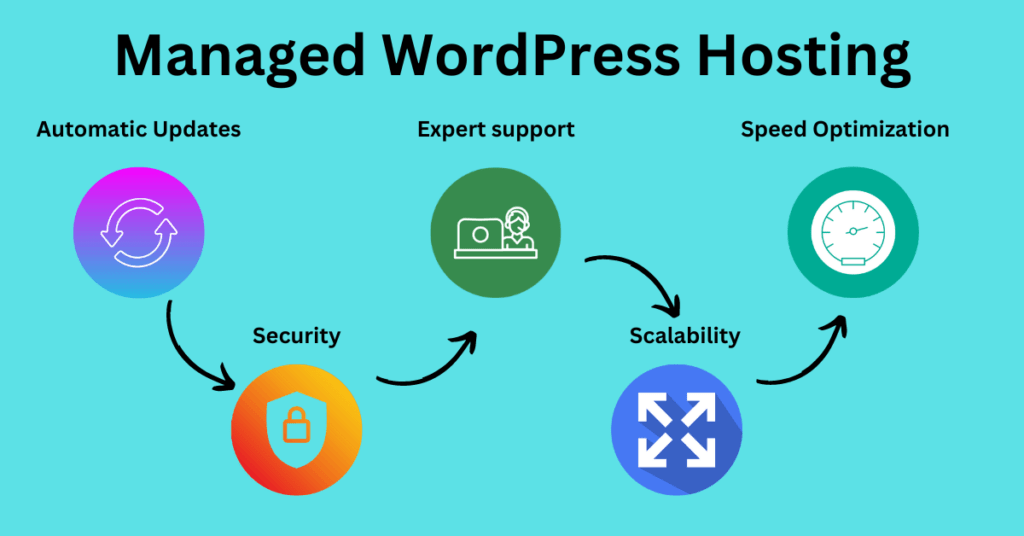Any business looking for an online presence needs a website and for a website, we require a domain name and good hosting. A domain is the name of your website. Web hosting is a space provided by web hosting service providers that allows websites to be available online for storing data. Hosting services providers provide necessary infrastructure, and resources to the website owners for their website to be accessible online. There are different types of web hosting services for businesses.
Let us explore and try to understand these one by one.
Different Web Hosting Services
- Shared hosting
- Virtual private server or VPS hosting
- Dedicated hosting
- Reseller hosting
- managed WordPress hosting
- Colocation hosting
- Cloud hosting
- Elementor’s managed WordPress hosting
Shared Hosting
Shared hosting is also called virtual hosting. It is one of the most popular web hosting services for beginner websites. In this type of hosting, a website shares the resources of a single physical server like CPU, RAM, and storage space with multiple sites. Each user is assigned a part of the server to store their files. The cost of hosting is accordingly divided among the users on the server. That keeps the hosting cost low for each website.

Since resources of a single server are being shared with multiple sites, the server performance may be impacted. This hosting type is best suited for new websites in the initial stages that do not have much data on them. Shared web hosting is best suited for small websites like entry-level blog websites, one-page websites, or even small eCommerce sites with small inventory.
Pros:
- As said, it is cost-effective and budget-friendly.
- It is easy to handle as it has a built-in control panel.
- You can visualize all the data of your website in one place.
- You get 24/7 technical support.
Cons:
- As the resources of a single server are being shared among many websites, the server’s overall performance may be impacted.
- In shared hosting, there are customization limits over the server so you may not get the best from your site.
- You may face cyber-security issues, as you do not know what other websites are about.
Virtual Private Server or VPS Hosting

VPS hosting is a hybrid form of both shared and dedicated hosting. A physical server is split into multiple virtual servers in this type of web hosting. Each website is assigned its virtual space, but several users share the physical server. It is more like a shared hosting with features of dedicated hosting. You avail the benefits of dedicated hosting at the cost of shared hosting. Also, you get more security and stability if you have mid-range website traffic.
VPS hosting is ideal for websites looking for dedicated hosting but not having the required technical knowledge. Growing businesses, eCommerce sites, and blogging sites that require more resources and control, can opt for this type of web hosting. With VPS web hosting, you get better customization and more storage space for the websites. A separate RAM and CPU are allocated for your website thereby enhancing the performance of your website. Due to high scalability, you can expect better resources with a spike in your website traffic.
Pros:
- VPS has an upper hand over the shared hosting as it has more flexibility, better resources, and performance.
- Users have customization control over their space to manage VPS settings according to their specific requirements. They can install and manage their software and operating systems.
- The number of sharing sites is limited. Therefore, your site’s performance is hardly affected due to the spike in traffic on other sites.
- VPS hosting is scalable and able to handle websites with high traffic.
Cons:
- More expensive compared to shared hosting not suitable for low-budget sites.
- Since the resources are shared, any security issues on the server may impact your site.
- A higher level of technical expertise is mandatory to manage VPS hosting making it less suitable for new websites.
Dedicated Hosting
 Dedicated hosting is most suitable for big websites with high daily traffic. In this hosting, the entire physical web server is dedicated to your website. Resources like CPU, RAM, storage space, etc. are utilized by your website. With guaranteed security and faster page loading, dedicated hosting is scalable and can handle massive website traffic without any lag.
Dedicated hosting is most suitable for big websites with high daily traffic. In this hosting, the entire physical web server is dedicated to your website. Resources like CPU, RAM, storage space, etc. are utilized by your website. With guaranteed security and faster page loading, dedicated hosting is scalable and can handle massive website traffic without any lag.
The bigger advantage of this type of web hosting is that you have complete control over the physical server. Moreover, since the server hosts only your website, there are no cybersecurity issues at all. You get approximately 100% uptime. Also, server monitoring and backup facilities are available for seamless and uninterrupted performance.
Server congestion is negligible and the service support is available round the clock.
Pros:
- Complete control over the physical server with admin access rights to the user.
- Round-the-clock unlimited database and software support.
- Most suitable for large websites.
- High performance and security with almost 100% uptime.
- Highly scalable with the capability of handling massive website traffic.
- Flexibility to utilize the server space according to your specific needs.
Cons:
- Much costlier as compared to shared or VPS hosting.
- Needs advanced technical expertise for the management of the server and software installation.
Reseller Hosting
As the name suggests, in this type Businesses or individuals purchase hosting plans in bulk from the hosting companies and resell them to their users. The advantage of reseller hosting is that the businesses need not have their own physical data center and they can start their own hosting business under their brand without any infrastructure cost. Moreover, they can set their own pricing and profit margin. In that way, reseller hosting can be a lucrative business model. The primary hosting service provider company handles any issues related to server configuration or software installation and updates.

Reseller hosting is more or less like shared hosting but in this hosting, you will get greater technical control than other hosting. This hosting is best suited for users with low budgets but still in need of high-end performance.
Pros:
- A good source of income for third-party hosting providers.
- As said earlier, no need to have any infrastructure.
- Businesses can set their own pricing and profit margins.
Cons:
- Resellers have to be dependent on the primary hosting company’s infrastructure.
- Any issue with the quality of the hosting can impact your client’s website.
- You have to provide round-the-clock customer support to your clients, which sometimes may prove challenging.
Managed WordPress Hosting
Websites developed using WordPress content management systems can use managed WordPress hosting (if you want to learn WordPress designing, you can read our blog on How to Make a WordPress Website). Apart from other hosting types, sites with managed WordPress hosting get a more optimized and secure environment. Regular backups and scheduled scans for malware are the best features of this hosting.

In this type of hosting, all the technical aspects of running the website smoothly like site performance, backups, security of the website, and software updates are taken care of by the hosting service provider. The hosting automatically updates plugins, themes, and software to keep your website secure and up-to-date. Website owners can expect a hassle-free environment and focus on creating and publishing content for the website without worrying about the health of their website.
Pros:
- Best hosting for new websites, startups, eCommerce stores, and blogging websites.
- 24/7 support from the service provider.
- Hosting environment is completely hassle-free.
- easy-to-use dashboard and site setup.
- Automatic updates of plugins and themes.
Cons:
- Highly expensive than other hosting types.
- This hosting is made for WordPress sites only. If you are using a different content management system, or want to switch to other platforms, you will have to select another website hosting solution.
- You do not have much control over the server and applications.
- Some plugins may not be compatible with WordPress.
Colocation Hosting
In colocation hosting you can place your privately owned physical web server in a third-party data center. The responsibility of the data center is to provide the necessary infrastructure to the server like 24-hour power support, required bandwidth, proper cooling, and hardware security. it is more or less like dedicated hosting but in this case, the user company itself provides the server to the hosting provider. Hosting provider charges for the maintenance of the server.
Colocation hosting is like dedicated hosting. In colocation hosting you have full control over the web server. The data center is used only for storage and a secure operational environment. Colocation hosting is an ideal option for medium and large-traffic websites that want to cut accompanying costs.
Pros:
- The main advantage of colocation hosting is that users have complete control of their server.
- You have customization rights to manage the server configuration.
- The data center provides high security, high uptime, greater bandwidth, and expert technical support.
Cons:
- Purchasing a web server and related equipment proves costlier for smaller businesses.
- Technical expertise is required to manage the server hardware.
- Physical access to the server depends on the location of the data center.
Cloud Hosting
Cloud hosting is different from traditional hosting. In this type of web hosting, many virtual servers are interconnected which handle the hosting load collectively. Resources used by websites are spread across many servers. This minimizes the chance of any downtime due to the malfunction of a particular server. Cloud hosting or cloud computing is becoming popular these days.

The pricing model of cloud hosting is pay-as-you-use. That means you pay only for the resources you consume. Cloud hosting is best suited for websites that experience variable traffic.
Pros:
- Easy to use and quite affordable.
- The Pay-as-you-use pricing model is very effective in cost cutting. You pay only for the resources you use.
- Easy access to the resources from anywhere.
Cons:
- Cloud hosting is a little bit complex to configure.
- You may get security issues due to shared resources.
- One major drawback of cloud hosting is that it can lead to unexpected costs incurred if not monitored carefully. You have to understand the resource usage pattern.
Elementor’s managed WordPress Hosting
All the above hostings are more or less complex in one or the other way. To manage your website on these hosting servers requires technical expertise. Apart from these, there is one more platform that provides hassle-free hosting plans to the users. If you do not want to deal with complex hosting plans or if you want to focus on growing your website, elementor’s managed WordPress hosting is the best option.

Elementor hosting gives a complete platform to build a website using WordPress and Elementor. All you have to do is sign on to the platform and start building your website with the help of pre-installed tools. The cost is as low as $9.99 per month for the first year.
Pros:
- Free Domain and SSL certificate from Elementor.
- Hosting is powered by the Google cloud platform.
- Fast and secure content delivery network (CDN) by Google Cloudflare.
- Elementor Pro and WordPress pre-installed.
- Automatic daily backups and on-demand backups also.
- Technical support for both hosting and Elementor.
Cons:
- Not much familiar hosting platform.
- Users get confused about whether Elementor is a page builder or a hosting service provider.
Conclusion
Choosing the right hosting plan can be challenging among many web hosting services available. It becomes essential to consider the best hosting plan for our needs. Each hosting type has unique features and serves distinct purposes. While selecting a web hosting plan for your website keep in mind the volume of traffic your website has, your resource requirement, and the technical expertise required to manage that hosting,
Look for a hosting company with a high uptime guarantee, easy updates, reliable customer support, and good user reviews. Also, see the pros and cons of each hosting before making any decision.
I have tried to explain each hosting type in detail to help you make an informed decision that will pave the way towards a reliable and efficient online presence for your business. If you found this article helpful, please leave a comment and also share it with other readers and show your support. That will motivate me to write more good readable articles for your benefit.
Thank you

